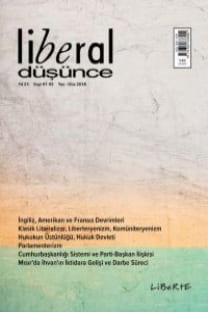Kim Göç Etmek İstiyor? Orta Doğu ve Kuzey Afrika’da Göç Eğilimleri
Göç, MENA Bölgesi, Arap Barometresi
Who Wants to Emigrate? Contemporary Migration Trends in the MENA Region
Immigration, MENA Region, Arab Barometer,
___
- Docquier, Frederic. ve Hillel Rapoport. "Globalization, Brain Drain, and Development". Journal of Economic Literature, 2012. Sayı:50(3), 681-730.
- Falco, Chiara ve Valentina Rotondi. "The Less Extreme, the More You Leave: Radical Islam and Willingness to Migrate". World Development, 2016. Sayı: 88, 122-133.
- Helliwell, John F. "How's life? Combining individual and national variables to explain subjective well-being". Economic modelling, 2003. Sayı: 20 (2), 331-360.
- Hoffman, Steven, Flavio Francisco Marsiglia ve Stephanie L. Ayers. "Religiosity and migration aspirations among mexican youth". Journal of International Migration and Integration, 2015. Sayı:16, 173-186.
- Knack, Stephen. "Social capital, growth and poverty: A survey of cross-country evidence." in C. Grootaert, & T. van Bastelaer, The role of social capital in development: An empirical assessment, 2002. Cambridge: Cambridge University Press. 42-82
- Lee, Everett. S. "A Theory of Migration". Demography, 1966. Sayı: 3, 47-57.
- Moss, Dana M. "Transnational Repression, Diaspora Mobilization and the Case of the Arab Spring", Social Problems. 2016. Sayı: 63(4), 480-498.
- Stark, Oded. "Inequality and Migration: A behavioural link". Economic Letters, 2006. Sayı: 91(1), 146-152.
- Oded Stark ve J. Edward Taylor. "Relative Deprivation and International Migration", Demography. 1989. Sayı: 26 (1). s.2.
- Stinner, William F., Mollie Van Loon ve Yongchang Byun. Plans to migrate in and out of Utah. Sociology and Social Research, 1992. Sayı: 76(3), 131-7.
- Tavits, Margit. "Making democracy work more? Exploring the linkage between social capital and government performance", 2006. Political Research Quarterly, Sayı: 59(2), 211-225.
- United Nations Department of Social and Economic Relations. "International Migration Report." 2017. New York: United Nations.
- Uslaner, Eric. The Moral Foundations of Trust. 2012. Cambridge: Cambridge University Press.
- ISSN: 1300-8781
- Başlangıç: 1996
- Yayıncı: Liberte Yayınları
Kim Göç Etmek İstiyor? Orta Doğu ve Kuzey Afrika’da Göç Eğilimleri
Ugur OZDEMİR, Yüksel Alper ECEVİT
Ludwig von Mises'te Bir Eylem Ontolojisi Olarak Praksiyoloji
İnsan Haklarının Evrenselliği ve Kültürel Görecelilik
Demokrasiye Neler Oluyor? Popülizm ve Otoriterleşme Tartışmalarına Bir Bakış
Türkiye'de Basın Özgürlüğü-Devlet Güvenliği Ekseninde Yaşanan Tartışmalar ve Bir Model Önerisi
Fatih KIRIŞIK, Samed KURBAN, Abdulkadir PEKEL
Kurumsal İktisatçı Olarak Hayek: Kültürel Evrim, Kurallar ve Kurumlar
Kemalist İdeoloji Bağlamında, Kent-Taşra Kurgusu ve Kent Psikolojisi
